Mirror work is strange, uncomfortable, undeniably intimidating, a little embarrassing …
… but also profoundly healing.
Of all the spiritual methods of inner work available to us in the 21st century, mirror work is one of the simplest and most powerful.

Spiritual Wanderer Course:
Being a lone wolf and a spiritual wanderer is a sacred calling in life – a unique and alchemical path of awakening. You don’t need to feel lost, alone, or stuck on your journey any more. It’s time to meet your soul’s deep needs for clarity, self-acceptance, and empowerment. Let us show you how …
Unlike many pathways to inner growth out there, you don’t have to go out and splurge large amounts of money or time.
Thankfully, mirror work is a practice that is freely available to anyone – all you need is a mirror! And nearly all of us already have access to one.
If you’re looking for a simple, practical, and deeply transformative practice that can become a daily habit of self-love, look no further than your bathroom mirror.
Note + Warning: Mirror work is a powerfully direct and potentially triggering practice for folks who struggle with high degrees of mental or emotional distress. Please consult your mental health carer if you’re suffering from issues such as psychosis, schizophrenia, OCD, intense anxiety or depression, grief, or NPD before doing this practice. Always take the best of care and be gentle with yourself.
Table of contents
What is Mirror Work?
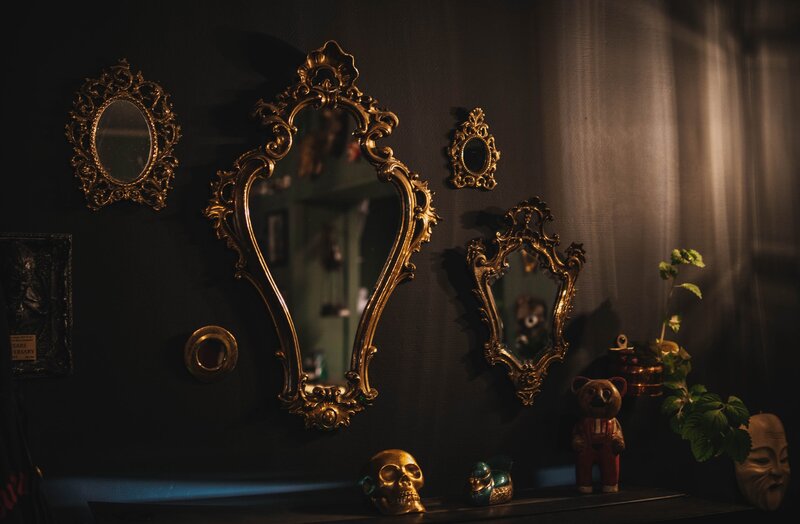
Mirror Work was a method originally developed by inspirational teacher Louise Hay as a way of getting in touch with the inner self. The primary purpose of mirror work is to develop self-love, self-care, and a more meaningful relationship with others.
By simply looking into the mirror for a certain amount of time each day and gently talking to yourself, you can foster a more compassionate and forgiving connection with yourself.
Why It’s Normal to Feel Uneasy in Front of the Mirror
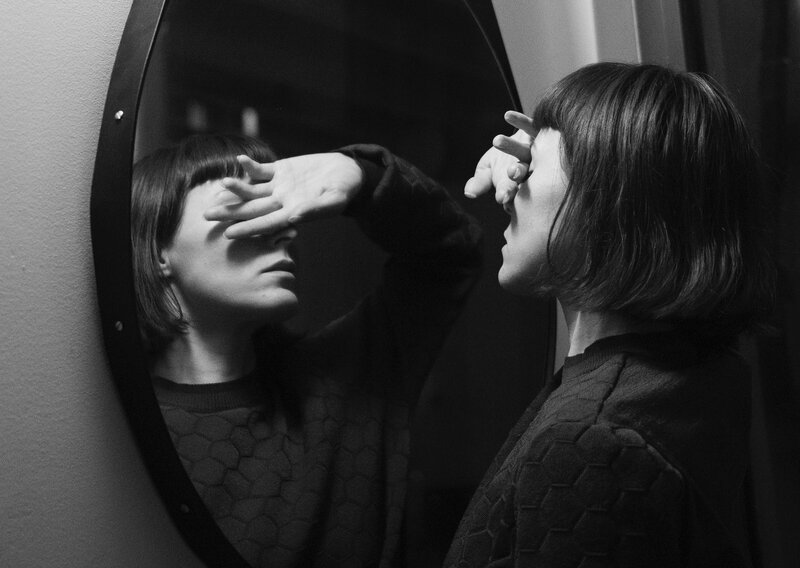
I have a challenge for you:

Shadow & Light Membership:
⭐️⭐️⭐️⭐️⭐ "Straight from the very first weekly email, this has been mind-blowingly powerful, the synchronicity and the on-vibe contents resonate uncannily with my soul’s current challenges." – Marie
Go sit or stand in front of the mirror in your house for five minutes. Simply stare at yourself and hold gentle eye contact. That’s all you have to do.
Now tell me how you feel.
If you’re like most people, you’ll feel uncomfortable. You may feel awkward, unsettled, embarrassed, or emotional. You might even notice patterns of self-loathing and self-criticism arise.
Why does this happen?
As Louise Hay writes in her book Mirror Work:
The mirror reflects back to you the feelings you have about yourself. It makes you immediately aware of where you are resisting and where you are open and flowing. It clearly shows you what thoughts you will need to change if you want to have a joyous, fulfilling life.
In other words, in front of the mirror, there is no hiding. In front of the mirror, we catch an intimate (and sometimes painful) glimpse into the relationship we have with ourselves.
Mirror work can make us feel initially uneasy because it exposes our inner critic in plain daylight.
Suddenly everything we feel about ourselves that we might not be aware of comes to the surface. And if you haven’t developed a compassionate relationship with yourself, you might be prone to believing all the nastiness whispered in your ear by your inner critic.
Spiritual Awakening & Mirror Work
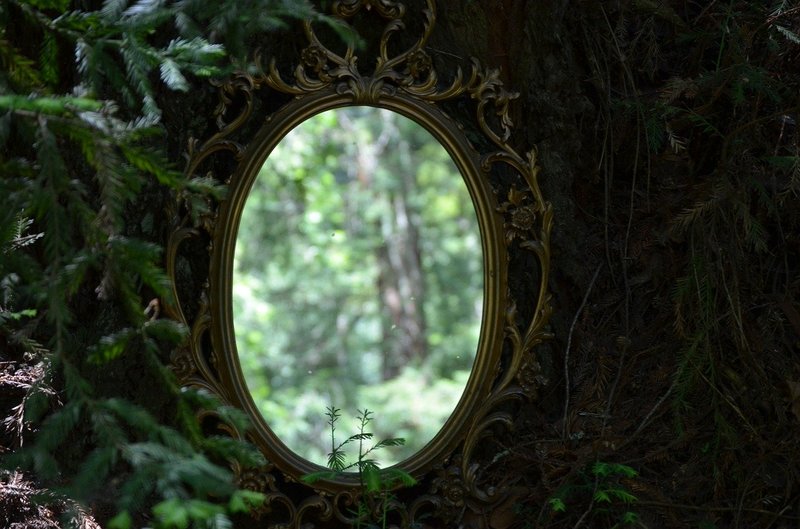
As a symbol of truth and clarity, mirrors are one of the most ancient and direct ways of accessing self-realization.
Some of the earliest uses of mirrors date back to Anatolia (now called Turkey) from 6,000 to 8,000 BC. These ancient mirrors were made out of obsidian, which itself is a stone symbolic of psychological purification, shadow integration, and protection.
Would you like to save this?
Your information will never be shared.
By using a mirror to consciously access the inner layers of our being, we gently remove the blocks and untie the knots preventing our ability to grow and evolve. Indeed, mirror work can facilitate a deepening of our spiritual awakening process.
Mirror Work and Reconnecting With the Inner Child

Another reason why mirror work can make us feel uncomfortable is that it exposes the vulnerable and neglected parts of our inner selves.
After all, what better opportunity for that forgotten part to finally grab our attention than face-to-face in front of a mirror?
Most of us have numerous abandoned inner parts, but the most common one that we’re disconnected from is the inner child.
We all possess an inner child – it’s one of the many archetypes (or patterns of energy) that compose our personality structures. The inner child is the part of us that still retains a sense of childlike wonder, spontaneity, creativity, and joy.
On the other hand, our inner child also possesses many of our primal and core wounds. Thus, learning how to relate to and liberate our inner child is crucial.
Mirror work is an intensely effective way of helping us to re-establish a connection with this delicate part of ourselves.
When looking into the mirror and trying to reconnect with the inner child, it’s not unusual to feel waves of sadness wash over you. You may also experience unexpected bubbles of excitement or joy. But typically, it’s common to experience heavier and more uncomfortable emotions first.
Although this kind of mirror work can be upsetting and unpleasant at times, these feelings point to deeper work that is alchemizing at a subconscious level.
Simply gazing at yourself in the mirror and comforting your inner child can be a tremendously healing practice and a powerful form of inner child work. The more emotions you experience, the more a sacred kind of purging and transformation is happening.
Mirror Work as a Portal into Your Soul

The eyes are the mirrors to the Soul as the old saying goes, and mirror work gives you direct access to this core part of your being.
However, it’s not always possible to directly connect with your deeper Self. Most people first experience a harsh inner critic that arises and serves as a doorkeeper to the deeper psyche.
To make it past that harsh doorkeeper, you must learn to disarm it through mindfulness and self-compassion. It’s at this point where inner work practices such as self-love become vital to work through your insecurities and self-resentments.
But how do you know that you’re reconnecting with your Soul?
I can’t answer that question for everyone.

Illumination Books Bundle:
Journey into the depths of your inner self with our Illumination e-book bundle, a transformative toolkit for spiritual growth and inner healing. Each book illuminates a different aspect of the soul's journey, from embracing sensitivity to integrating your dark side.
But for me, the presence of my Soul emerges when my face softens, my eyes become warmer and more compassionate, a slight smile enters my face, and a lighter form of energy fills my body. I also tend to feel like I’m being drawn inwards into an embrace.
As magical or mystical as that may sound, using mirror work as a portal to your Soul is actually quite natural. There is nothing phantasmagorical about it – it feels like returning home to the truest, most whole, and wisest part of yourself.
How to Practice Mirror Work (Step-By-Step Guide)

There are no official methods of doing mirror work – although you can try the 21-day practice developed by Louise Hay in her book.
Personally, I prefer to tailor mirror work to myself and my own needs. Here are some of the fundamental principles of mirror work that you might like to keep in mind if you want to create your own practice:
- Use affirmations that feel authentic to you (I’ll explain this more below)
- Dedicate at least two minutes every day
- Do mirror work in private so that you aren’t disturbed (or feel the need to keep your guard up)
- It’s okay to feel emotional – let yourself feel whatever comes up
- Keep a journal where you record any notable experiences (I’ll explain this more below)
With that being said, here’s a simple step-by-step guide to mirror work that you can use and adapt to your own needs:
1. Commit yourself
Mirror work creates the deepest changes when it’s done consistently over a long period of time. I recommend dedicating a minimum of two minutes a day, with ten minutes or more being ideal.
2. Think about the best time of day
Mirror work is flexible and can work around your schedule. Most people like doing mirror work in the early morning and late at night before going to bed.
You can also do mirror work during the day as you pass mirrors. If there are no mirrors in your workplace, you can always use the selfie option on your phone (where you turn the camera towards yourself).
You can find a private spot (such as in a bathroom cubicle) to do this exercise while at work.
3. Choose or create your own affirmation
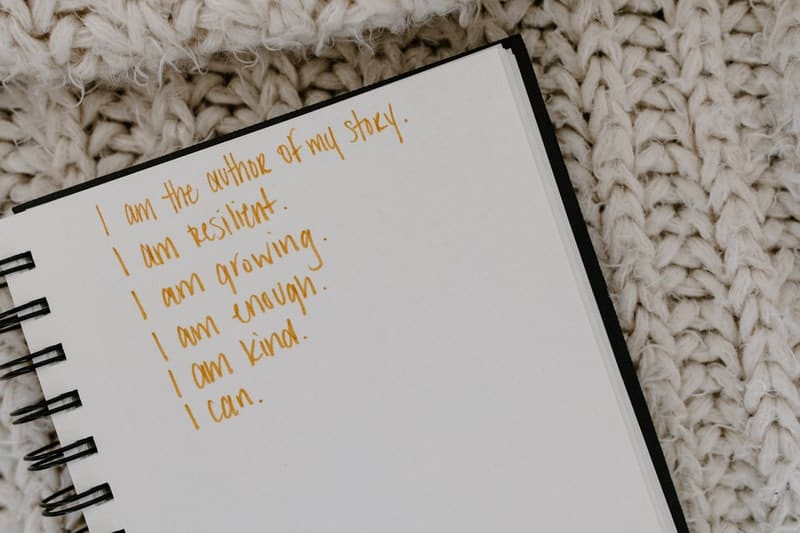
Why use affirmations, you might wonder?
Affirmations counteract the negative self-talk that runs through our heads – they also help to reprogram our minds.
When we use affirmations, we are affirming something that we like about ourselves or something positive we wish to give ourselves.
You may like to create your own affirmation spontaneously based on how you feel when you look in the mirror. For example, if you feel ugly in that moment of time, you can affirm to yourself, “I have a beautiful heart and soul” or whatever feels most authentic to you.
If you feel uncomfortable in your own presence, you can affirm, “It’s okay to feel uncomfortable, I accept myself as I am.”
Alternatively, you can choose from a list of affirmations and experiment with using one affirmation each day (or one for a week). Here are some examples:
- I’m learning to love you
- I’m willing to take care of you
- I love how thoughtful/caring/sincere/____ you are
- I am worthy of love
- I am enough
- I am exactly who I need to be in this moment
- It’s okay for me to feel scared
- It’s okay for me to feel sad
- It’s okay for me to feel awkward
- I love how unique my body is
- I am beautiful
- I am whole
- I lovingly embrace my fears
- I am fierce and strong
- I trust in my natural wisdom
- I am open and receptive
- I believe in myself
You can find a longer list of affirmations in our morning affirmations article.
A note on affirmations: If you’re creating your own affirmations, please ensure that you keep them phrased in a positive way. Many practitioners who work with affirmations (such as those who study NLP) assert that the unconscious mind does not understand negatives and will translate any negatively phrased affirmation in reverse. For example, instead of saying “I am not worthless, I am worthy” say, “I am worthy.” Or instead of saying, “I will not be mean to myself” say, “I treat myself with kindness.”
Also, the point of affirmations isn’t to sugarcoat how you feel.
If you genuinely can’t say to yourself in the mirror “I love you” then don’t!
The point isn’t to be disingenuous, the point is to offer sincere love to yourself.
If an affirmation such as “I love and accept you” feels too difficult, focus on a milder affirmation such as “I am learning to love and accept you” or “I want to love and accept you more.”
4. Repeat your affirmation (with feeling)
Repeat your affirmation to yourself at least ten times, whether out loud or in your head.
Some people will recommend at least 100 times – but that can seem overwhelming when you’re just beginning this practice!
Certainly, the more you repeat your affirmation with sincerity, the deeper impact it will make. So try to set a realistic number and stick to it. You can always increase the number of times you say your affirmation while doing mirror work as you progress.
Also, when saying your affirmation, it’s important to look at yourself directly in the eyes.
You may also like to use your own name as this sends a powerful message to your unconscious. For example, you may wish to say, “I appreciate how caring you are [insert your name here]”, “I love you [insert your name here].”
5. Embrace any emotions that arise
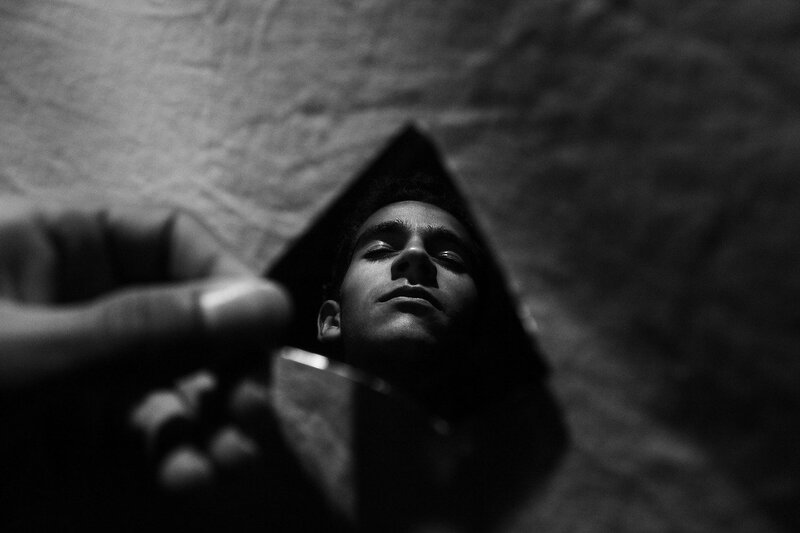
It’s normal and okay to feel upset. If you feel the need to cry, let yourself – you’re releasing old ways of being, and that is powerful work!
You may also wish to give yourself a hug, which is also wonderfully therapeutic.
It’s highly likely that you’ll feel emotional at some point and that’s because the old frozen pain within you (that has built up through the years) is bubbling to the surface.
Sometimes the emotions we feel during mirror work are from childhood, particularly if they’re intense. If this is the case, comfort your inner child by acknowledging him/her within you as you look at the mirror. You may wish to say words such as, “It’s okay, I see you, I understand,” “I’m here for you,” “I love how brave you are little [insert name],” etc.
A note about men doing mirror work: Feeling and expressing emotions will likely be more difficult for men than for women. Why? Men are conditioned to perceive stoicism as a true measure of manliness – but the truth is that being “stoic” can sometimes be confused with emotional repression.
There’s nothing courageous about avoiding emotions. If you’re a man, you’ll need extra reassurance and compassion through this stage of the work. Have some deep and powerful affirmations on hand and the willingness to see your emotional openness as true strength.
6. Place a hand over your heart
Sometimes, mirror work can feel particularly intense. If you feel overwhelmed by any experience, you’re always free to walk away and come back to it later.
However, often what’s let through into your conscious mind is just the right amount for you to handle (that is, after all, the role of the psyche and the ego in particular).
To help you process any strong feelings and ground yourself in your body, try placing a gentle hand over your heart. This simple action helps you to remain embodied and connected with love.
You can read more about this practice in our deep listening article.
7. Record your discoveries
It’s crucial during the course of your mirror work to keep a journal.
Don’t worry about being a great writer. Ignore spelling and grammar – they’re irrelevant. The point of recording your discoveries is to help you spiritually integrate what you’ve learned.
You also don’t need to worry about writing longwinded paragraphs if that doesn’t suit you – simply write a sentence or two. Record how you feel and what thoughts, feelings, or sensations arose within you.
There’s no need to keep a mirror work journal every day, but it’s important to write in this journal when you’ve had a particularly important experience that triggered emotions or epiphanies.
By keeping a journal, you’ll be able to track your evolution and progress, having something to come back to in the future and reflect upon.
Learn more about how to journal.
***

Mirror work is deceptively simple but tremendously empowering. So much healing work can be done by simply looking at yourself in the mirror and expressing self-loving affirmations.
One of the most amazing side benefits of mirror work is how it impacts your relationships. By learning how to love yourself more, life becomes more harmonious and your connections with others blossom and flourish.
And finally, mirror work helps to facilitate and deepen our spiritual awakening, aiding us in gaining clarity and inner illumination.
If you’ve dabbled with this fascinating tool or are a loyal advocate, share with me your experiences. What part of mirror work is the most difficult for you? What epiphanies or revelations have you had?
If you need more help, we offer 3 powerful ways to guide you on your inner journey:
1. The Spiritual Wanderer Course: Feeling lost or uncertain about your path and purpose in life? Gain clarity and focus by learning about the five archetypes of awakening within you. Discover your deeper path and purpose using our in-depth psychospiritual map. Includes 3+ hours of audio-visual content, workbooks, meditations, and a premium test.
2. Shadow & Light Membership: Seeking ongoing support for your spiritual journey? Receive weekly intuitive guidance and learn to embrace your whole self, including your shadow side. Deepen your self-love and receive personal support from us.
3. Spiritual Awakening Bundle: Ready to soul search and dive deep? Access our complete "essentials" collection of beloved journals and eBooks. Includes five enlightening eBooks and seven guided journals, plus two special bonuses to further illuminate your path.








Need advice, my daughter has just told me that upon looking at herself in mirror briefly before leaving house, she noticed that the mirror showed her wearing “goth like” makeup, but she was not wearing any. What can i advise her about situation?
Wow, I didn’t know this was a known technique!
I have used this twice in my life before in dark times. I would ask myself while looking in the mirror. “Do you like what you see?”
It is difficult at first but after a week you generally back on track
Leon
What would be a mantra or affirmation to use with mirror work (to really close-out the sessions)in the instance that I hold myself accountable with a personal code of conduct and when I am displeased with my adherence to that, I want to avoid looking in the mirror and/or the inner responses I perceive are viciously raw (they are also more apparent during sleep, which is causing insomnia & anxiety episodes). I need a better way to manage (re-)integrating the various tangents my inner self is discovering.
I’m not sure why, but in doing this and looking at myself in the mirror in the eyes there was no depth. In other words I felt like I was just looking at my current self, nothing from the past came up.
I’m about to try another “portrait” from the mirror. And I’m trying to enlist the help of my family to relocate the one I apparently made unconsciously when I was 15 years old… Thankfully, I still “see” it in my mind, but I’m curious how “accurate” my memory is when shown the “original”.
Hello, that is great website, thank you for amazing knowledge. I tried mirror work and when I look into my eyes deeply I started seeing horrifying faces and felt enormous fear. Then I researched and noticed I done it wrong, It was gazing and being present with self but I accidentally summoned demons :) So please add to your article that it is not staring in the eye. I almost had a heart attack in the middle of the night in home alone :) Now having hard time do the mirror work.
planning on trying this for the first time when I get home. Don’t want an affirmation that would be untruthful, but I want to explore deeply. (since I’m a man and all). This could be really scary.
A couple of months ago I started realizing that I needed to make a change within me. As a 66 year old man, I am just beginning to learn how to love myself. I was born with some birth defects. As a child, I had multiple surgeries to correct those defects. It has been a difficult thing to deal with. Whenever I looked in the mirror (to comb my hair, or whatever else needed to be done) I did not like what I saw. The physical scars were there to see. I simply did not like my appearance. And that affected everything else in my life. When I found out about loving myself, I thought it could not be done. But I realized my life was getting nowhere. So I tried the mirror work. It was very hard and I wanted to quit. I kept at it. I can tell you that for now, I do the mirror work. It has gotten easier. I am finding the love within. I have a long way to go. I understand it is a lifelong process. I get that. The scars are still there. The emotions connected to those scars are there. But… Read more »
I was wondering about getting the book, but do I need it?
Usually what happens when I look into a mirror I give myself a big smile.
I look into my eyes, I feel good, I start making weird faces and I feel happy with myself.
I look at my features and marvel a bit at how good I’m looking (although I don’t think most people think I’m good looking).
What does that tell me about myself? Could I profit from mirror work?
I just wanted to share my experience with mirror work. To be honest, my problems with myself in mirror work are more emotional than physical. I grew up in a place where beauty pressures were discussed early in a school environment, my parents and other caretakers always reminded me I was beautiful inside and out and so on. But at the same time, a focus on appearances in expressing yourself was devalued. I wore the same uniform to school and my family wore simple clothes. I just found. . . that while I think of myself as a pretty masculine person, I actually found some need to be vain, to dress up my hair somewhat. My face, while rather boyish, has always been rather “pretty”. I just realized that a part of me just doesn’t want to be as plain and conservative in style as my parents have. People always told me growing up how I looked like my parents, and I realized that without knowing up, I had gained a disgust with myself due to that association. It’s not that I hate my parents or think they were bad people, flawed as they are, it’s that I felt strongly… Read more »